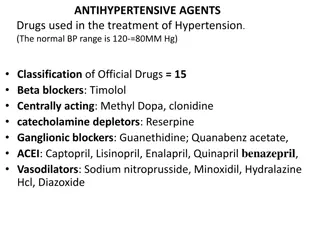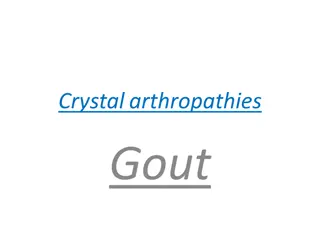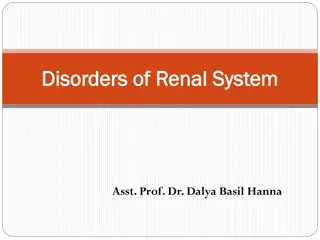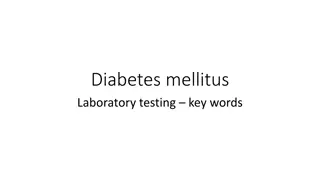GOUTY NEPHROPATHY
Gouty nephropathy is characterized by the deposition of uric acid crystals in the kidney, leading to inflammation and potential kidney damage. This condition predominantly affects men and is associated with a decrease in urine production and elevated creatinine levels. Explore the pathology, signs, symptoms, and types of gouty nephropathy, including acute and chronic forms. Learn about the incidence rate, risk factors, and diagnostic indicators to better understand this renal disorder.
Download Presentation

Please find below an Image/Link to download the presentation.
The content on the website is provided AS IS for your information and personal use only. It may not be sold, licensed, or shared on other websites without obtaining consent from the author.If you encounter any issues during the download, it is possible that the publisher has removed the file from their server.
You are allowed to download the files provided on this website for personal or commercial use, subject to the condition that they are used lawfully. All files are the property of their respective owners.
The content on the website is provided AS IS for your information and personal use only. It may not be sold, licensed, or shared on other websites without obtaining consent from the author.
E N D
Presentation Transcript
Incidence Incidence The incidence rate is not known It s seen in men compared to women within ratio 4:1.
Pathology Of Gouty Nephropathy Pathology Of Gouty Nephropathy Uric acid crystals and urates are deposited in the kidney. This leads to irritation and acute inflammation,more time, more deposition. This deposits act as forgein body granulomatous reaction ( macrophages, lymphocytes,fibrpblasts) forming white chalky nodules which is the TOPHUS
Signs and symptoms The chief sign is : Decrease production of the urine. In a blood test : Rise in the creatinine level. In a urine sample : Uric acid/creatinine Ratio > 1
TYPES OF GOUTY NEPHROPATHY
Acute gouty nephropathy Overproduction of uric acid occurs primarily when tissue breakdown is accelerated. Acute uric acid nephropathy is the term applied to the development of acute oligoanuric renal failure caused by renal tubular obstruction by urate and uric acid crystals. This is observed almost exclusively in the setting of malignancy, especially leukemia and lymphoma, in which rapid cell turnover or cell lysis occurs from chemotherapeutic agents or radiation therapy
Chronic Gouty Nephropathy A widely accepted belief is that the overproduction of uric acid and the presence of hyperuricemia can cause acute kidney failure; however, whether chronic hyperuricemia independently results in chronic interstitial nephritis and progressive kidney failure is less clear. In patients with chronic hyperuricemia and gout, early studies revealed microtophi formation in the renal medullary interstitium. These deposits were found to contain monosodium urate monohydrate and to be surrounded by a giant cell reaction. Thus, the theory was that urate deposition triggers a foreign body reaction and leads to chronic inflammation and fibrosis.
Cases associated With gout During treatement for leukaemia or lymphoma. Other malignancies, such as metastatic breast cancer, lung cancer, or disseminated adenocarcinoma. Seizures and pregnancy-related pre-eclampsia or eclampsia may also have an association with gouty nephropathy. Moreover renal transplantation or longstanding use of a medication by the name of cyclosporine may also lead to gouty nephropathy.
General measures Serum uric acid concentrations may be reduced with non-pharmacologic therapy : Useful dietary and lifestyle changes include: Weight reduction Decrease alcohol ingestion Decrease consumption of foods with a high purine content Control of hyperlipidemia and hypertension. However, these measures will probably not reduce serum uric acid levels to normal, which is the treatment goal for the prevention of acute gout attacks. Symptomatic hyperuricemia usually requires medication.
Treatment of acute gouty nephropathy Cholchicine and demicholine ( specific anti-inflammatory drugs) NSAIDS as indomethacine (in patients who cannot tolerate colchicine ) Glucocorticoids and ACTH (If NSAIDS are ineffective)
Treatment of chronic gouty nephropathy Treatment of chronic gouty nephropathy ( (prophylactic treatment) prophylactic treatment) Uricosuric drugs: probenicid , sulphinpyrazone,benzbromarone, aspirin Uricostatic drugs: allopurinol,Fuboxostat
Thank Thank YoU YoU











